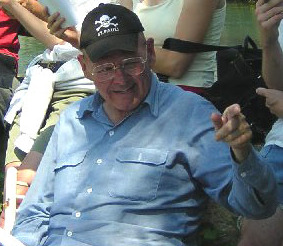Reginald Foster (Latinist) facts for kids
Quick facts for kids
Reginald Foster
OCD
|
|
|---|---|
 |
|
| Born |
Reginald Thomas Foster
November 14, 1939 |
| Died | December 25, 2020 (aged 81) Milwaukee, Wisconsin, U.S.
|
| Nationality | American |
| Occupation | Priest, Latinist |
Reginald Thomas Foster (November 14, 1939 – December 25, 2020) was an American Catholic priest and a friar (a type of monk) from the Order of Discalced Carmelites. He was known for being an amazing expert in the Latin language.
From 1970 until 2009, he worked at the Vatican. His job was in the Latin Letters section. This office writes official letters for the Pope in Latin. He also taught Latin for many years. He gave classes at universities in Rome and even offered free summer courses. Later, he continued teaching when he moved back to Milwaukee.
Early Life and Vatican Work
Reginald Foster grew up in Milwaukee, Wisconsin. His family members, including his father and uncles, were plumbers. When he was just 13 years old, he decided to become a priest. He said he had three main goals in life: to be a priest, to be a Carmelite, and to work with Latin.
At 15, he went to a special school for future priests in Peterborough, New Hampshire. There, he truly fell in love with the Latin language. He officially joined the Carmelites in 1959.
In 1962, Foster moved to Rome, Italy, to continue his studies. In 1970, he started working in the Vatican's Latin Letters Office. He was the first American to hold this important position. He worked there for 40 years, helping to write official documents in Latin for the Pope. He retired in 2009 and returned to Milwaukee.
While living in Rome, Foster lived a very simple life. He slept on the floor and gave away most gifts. He believed that priests should dress simply, like ordinary people. So, he often wore blue shirts and pants from Sears. He also wore plain black sneakers. Because of his simple clothes, the Swiss Guards at the Vatican sometimes called him il benzinaio, which means "the gas-station attendant."
Teaching Latin
Besides his full-time job at the Vatican, Foster was also a priest. He helped students one-on-one and had a weekly radio show called The Latin Lover on Vatican Radio.
Starting in 1977, he taught ten Latin courses each year at the Pontifical Gregorian University in Rome. In 1985, students asked him to start a summer school. He created an eight-week program that met seven days a week. The best part was that this summer school was completely free!
In 2006, the university stopped him from teaching there. This was because he allowed too many students to take his classes for free. So, in November 2006, Foster started his own free Latin school. It was called Academia Romae Latinitatis.
In 2008, Foster became sick and had to go to the hospital. He was flown back to the United States for more care. Even while recovering, he continued to teach free Latin classes. He taught at the University of Wisconsin–Milwaukee and later even from his nursing home.
Reginald Foster passed away in Milwaukee on December 25, 2020. He was 81 years old and had tested positive for COVID-19.
Foster's Unique Latin Method
Reginald Foster was an expert in Latin literature, especially the writings of Cicero. He was known around the world for his knowledge of Latin. He believed that Latin should be taught as a living language, not just a dead one.
Many Latin teachers were inspired by him. For example, Nancy Llewellyn started an organization called SALVI. This group helps people learn Latin as a living language. Two of his former students also restarted his summer school in Rome. They created a non-profit group called the Paideia Institute. This group now teaches Latin and Greek in many places.
Foster also led a project to create a modern Latin dictionary. It was called Lexicon Recentis Latinitatis and was published between 1992 and 1997. After he retired, he wrote his own Latin book called The Mere Bones of Latin (Ossa Latinitatis Sola) in 2016.
Foster was a very strict teacher. He was sometimes called a "brash curmudgeon" by his students. He would warn them, "if you make one stupid mistake, you're out!" He didn't care for complicated theories about language. He wanted students to focus on understanding the basics.
His teaching method was very unusual. He did not make students memorize long lists of grammar rules or vocabulary. Instead, he taught Latin step-by-step. He broke down grammar into tiny, easy-to-understand ideas. For example, he might teach how to say "and" in Latin.
Then, he would give students real Latin texts. These texts were from different authors. Students would search for and find the grammar forms they had just learned. This way, students read real Latin literature from the very first day. They didn't just study boring grammar exercises. Each lesson was made stronger with long homework assignments. These often took many hours to finish.
A big part of Foster's success was his deep love for the Latin language. He called it "a precious thing here on Planet Earth." Even in large classes with over 100 students, he learned everyone's names. He helped each student learn, sometimes praising them and sometimes pushing them to do better.
Foster was worried about the decline in Latin teaching. He worked hard to bring the language back to life. A writer named Alexander Stille wrote about him in a book. Stille described Foster as "a one-man Audubon Society for the Latin language." This meant Foster was determined to save Latin from disappearing.
However, Foster did not want to go back to using Latin in church services. He thought it made the Vatican look "a bit medieval." Instead, he believed it would be better if the Pope simply read Latin in his own home.
Images for kids
 | Bayard Rustin |
 | Jeannette Carter |
 | Jeremiah A. Brown |


